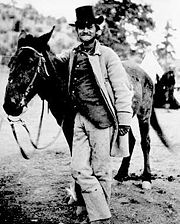
Frederick Wadsworth Loring
Encyclopedia

Phillips Academy
Phillips Academy is a selective, co-educational independent boarding high school for boarding and day students in grades 9–12, along with a post-graduate year...
, Andover, Class of 1866, and then Harvard University
Harvard University
Harvard University is a private Ivy League university located in Cambridge, Massachusetts, United States, established in 1636 by the Massachusetts legislature. Harvard is the oldest institution of higher learning in the United States and the first corporation chartered in the country...
, where he first made his mark with contributions to the Harvard Advocate
The Harvard Advocate
The Harvard Advocate, the literary magazine of Harvard College, is the oldest continuously published college literary magazine in the United States. The magazine was founded by Charles S. Gage and William G. Peckham in 1866 and, except for a hiatus during the last years of World War II, has...
. He graduated in 1870. Inheriting a love of literature from his mother, who died when he was eleven, he quickly gained in stature as an up-and-coming American author. In 1871, he published a novel, Two College Friends, and a book of poems, The Boston Dip and Other Verses. Two College Friends, which featured highly charged scenes of young men in battle during the Civil War
American Civil War
The American Civil War was a civil war fought in the United States of America. In response to the election of Abraham Lincoln as President of the United States, 11 southern slave states declared their secession from the United States and formed the Confederate States of America ; the other 25...
, has been singled out as an important work in the history of romantic male friendship
Romantic friendship
The term romantic friendship refers to both very close but non-sexual relationship and at times physical relationship between friends, often involving a degree of physical closeness beyond that which is common in modern Western societies, and may include for example holding hands, cuddling,...
. He also made numerous journalistic and creative contributions to such periodicals as the Atlantic Monthly, Appletons' Journal, Old and New, the Independent and Every Saturday during this time.
Wickenburg Massacre
In the spring of 1871, Appleton's Journal sent him as a correspondent to Arizona on an expedition to be led by Lt. George M. Wheeler. The articles he wrote for the journal included "a Council of War," "a Glimpse of Mormonism," "Silver Mining in Nevada," and "the Valley of Death." Their party suffered several setbacks, and in August of 1871, Loring wrote to his employers from Death ValleyDeath Valley
Death Valley is a desert valley located in Eastern California. Situated within the Mojave Desert, it features the lowest, driest, and hottest locations in North America. Badwater, a basin located in Death Valley, is the specific location of the lowest elevation in North America at 282 feet below...
, "I am bootless, coatless, everything but lifeless. I have had a fortnight of horrors. This morning an Indian fight capped the climax. However, I am well and cheerful." Although they escaped from the valley, his party's carriage was attacked on November 5 by a band of Yapavai near Wickenburg, Arizona
Wickenburg, Arizona
Wickenburg is a town in Maricopa County, Arizona, United States. According to 2006 Census Bureau estimates, the population of the town is 6,423.-Geography:Wickenburg is located at ....
, while on the way to La Paz
La Paz County, Arizona
La Paz County is a county in the western part of the U.S. state of Arizona. As of the 2010 census its population was 20,489. The county seat is Parker...
in an ambush that came to be known as the Wickenburg massacre
Wickenburg massacre
The Wickenburg Massacre was the November 5, 1871, murder of six stagecoach passengers en route from Wickenburg, Arizona Territory, westbound for San Bernardino, California, on the La Paz road.-Massacre:...
. The driver, Loring, and four other passengers were killed.
After his death, he was mourned by Charles Reade
Charles Reade
Charles Reade was an English novelist and dramatist, best known for The Cloister and the Hearth.-Life:Charles Reade was born at Ipsden, Oxfordshire to John Reade and Anne Marie Scott-Waring; William Winwood Reade the influential historian , was his nephew. He studied at Magdalen College, Oxford,...
as having been the most promising of all young American authors. Several of Loring's poems, such as "In the Old Churchyard at Fredericksburg" and "the Old Professor," were posthumously included in American verse anthologies.

